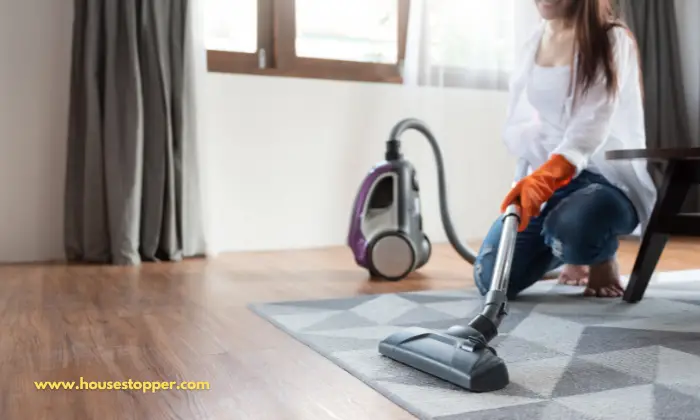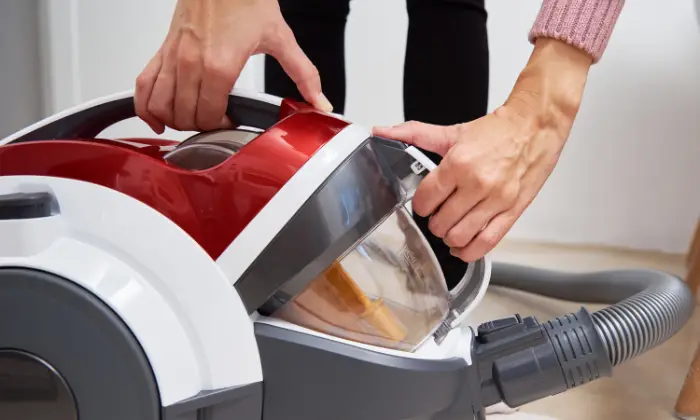Vacuums can make an impressive amount of vacuum noises, and we’re not just talking about the beep sound it makes when it’s ready for use. There are a lot of different sounds a vacuum cleaner can make, which can often be confusing.
We’ll also explore recognizing when a vacuum cleaner is worn out and what to do if it’s making too much noise. So, please read on to learn What sound does a vacuum cleaner makes!

This article will explore the different vacuum cleaner sounds or vacuum noises and explain why they’re made?
“Discover the Quietest Vacuum Cleaner on Amazon!”
Are you tired of dealing with noisy vacuum cleaners that disrupt your peaceful home environment? Look no further than the quietest vacuum cleaner on Amazon! We’ve scoured the marketplace to find the top-rated vacuum cleaners that will clean your home without the annoying noise. Click the link to check out the list of the quietest vacuum cleaners on Amazon and make cleaning a breeze!
What sound does a vacuum cleaner make
Regarding vacuum cleaners, it’s essential to know the different sounds they make. This will help you troubleshoot problems and get back to cleaning! The most common sound is the suction noise, indicating that the vacuum works correctly.
Other noises include the beep when the power cord is plugged in, and the motor is running. If you’re in doubt as to what sound your vacuum is making, consult your manual. In the meantime, enjoy cleaning your home with ease!
1. The Sounds That Each Type Makes
There are several sorts of vacuum cleaners on the market with distinct noises. Some make noise while working, while others produce beeps or whistles for different purposes. To identify which type of vacuum cleaner is needed for a specific job, you must understand how the motor works and what sounds it makes.

For example, a bagless vacuum cleaner has a special motor that creates a ‘thump’ as dirt and debris are picked up. On the other hand, an upright vacuum cleaner usually has two motors
– One in the hose and another in the wand
– That works together to move objects around.
This model produces different sounds depending on which part of it is used: when the nozzle reaches tight spaces or furniture edges, it makes a ‘snapping’ noise.
Meanwhile, the motor whirrs at high speed when sweeping carpets or floors.
Why does a vacuum cleaner sound louder than usual?
For many of us, the sound of a standard vacuum cleaner is synonymous with cleanliness. But what’s the deal with the high-frequency noise that loud vacuum cleaners make?
It concerns the cleaner head (or motor) moving back and forth over the floors or carpets.
This motion creates a vibration that’s heard as sound. The higher the frequency of this vibration, the louder the vacuum cleaner sounds. Changing your vacuum cleaner’s filter can sometimes reduce or eliminate this high-frequency noise.
So, next time you’re shopping for a new vacuum cleaner, check out its loud sounds or noise level to see if it fits your home well.
1. The noise levels depend on the speed and width of the nozzle
Noise decibels in vacuum cleaners depend on several factors, including the speed and width of the nozzle.
The wider the nozzle, the louder the vacuum cleaner will sound. When it comes to reducing noise levels, there are a few things you can do: use a soft rug or go for a lower speed on your vacuum cleaner.
2. Different models produce different sounds
Regarding vacuum cleaners, there are two main types: upright and canister. The suction power pulls the dirt and debris into the vacuum cleaner. The different vacuum models use various filtration systems, including HEPA (high-efficiency particulate arresting), which helps to remove dirt, dust, and foreign particles from the air. This is why vacuum cleaners often sound louder than those without one. The noise made while running is due to the rotating blades inside of it.
3. The suction power creates the sound of a vacuum cleaner
If you want to avoid being too loud, it’s essential to adjust the suction power of your vacuum cleaner accordingly. The vacuum cleaner will sound louder as the suction power increases. The blades are spinning more quickly and at a more excellent pace.
4. Here are also unique modes for delicate surfaces
If you’re worried about the noise your vacuum cleaner is making, don’t be. The higher the speed of the motor, the louder it will get. And if you have a vacuum with unique modes for delicate surfaces like carpets and upholstery, check out its instruction manual! These vacuums are meant to keep dirt from accumulating on these surfaces, so your house always looks clean and neat!
5. This is how you get the vacuum cleaner quieter again
No matter how often you clean the vacuum cleaner, it will eventually make a noise. Trying to restore the sound levels to their original state can be frustrating, but it’s possible with a few simple tips. First and foremost, don’t forget to clean the filter!
It will help to lower the noise produced by the vacuum cleaner. Next, try following these steps to restore the sound levels:
– Listen to the vacuum cleaner in different positions and see if you can identify the noise source.
– Check the motor and belt for wear and tear.
– Check the suction power by trying to remove something from a high surface.
– Try adjusting the suspension and telescopic wand.
– Test the vacuum cleaner by running it on a low setting and see if the noise reduces.
– If all else fails, replace the motor.
6. Adjusting the tips and height of the brush roll
If you’re finding that your vacuum cleaner is too noisy, it might be worth considering adjusting the brush roll tips and height. Also, clean the dustbin and filters regularly to reduce noise levels further.
If this still isn’t enough, try using the correct type of attachment for your vacuum cleaner – this will also play a part in reducing noise levels.
7. Checking Hoover’s air filter
Hoover is an excellent machine for cleaning upholstery, carpets, and floors, but it can be pretty noisy. You should check Hoover’s air filter and other parts to reduce the noise level.
If it needs to be replaced, get the right type and size – this will help improve your vacuum cleaner’s overall performance.
8. Understanding the motor
When it comes to your vacuum cleaner, keeping it running smooth and efficient is of the utmost importance. Lubricating the moving parts regularly and keeping them clean is one of the most important things you can do.
This will help your vacuum cleaner work at its most efficient performance level by reducing noise levels.

Besides cleaning filters, understanding how each part works in the motor can also help you troubleshoot any issues quickly.
Knowing where to locate burrs, belts, or brushes can save you time and hassle when trying to fix a problem yourself – no matter how complex!
9. Relaxing the belt
Many people unknowingly cause damage to their vacuum cleaners by not taking the necessary precautions while cleaning them.
Attachments that are not correctly attached or obstruct the belt’s motion are one of the most common causes of belt wear and noise.
To avoid this, before the beginning of the cleaning, it’s recommended to pour some water or foam into the machine to generate a cushion for the belt.

Moreover, when it comes to relaxing the belt, you need to do it one step at a time.
Don’t try doing too much all at once – otherwise, you might end up causing more harm than good!
If your vacuum cleaner makes excessive noise while in use, chances are that something obstructs its Belt-O-Motion™ technology, and you should consider it when fixing these problems.
Are you tired of the loud vacuum noises your vacuum makes? Learn how to quiet it down and make cleaning a peaceful experience with these easy tips and tricks. Click here to check out our article on How to quiet a vacuum cleaner even if it’s too loud!
FAQs about What sound does a vacuum cleaner make?
Q: What kind of noise does a vacuum cleaner make?
A vacuum cleaner makes a whirring noise. It can also make beeping noises and humming sounds.
Q: What if my vacuum cleaner starts making strange noises?
If your vacuum cleaner is making strange or loud noises, be sure not to overload it and to clean up where dust and debris accumulate. Additionally, if the noise isn’t going away with standard cleaning procedures, it might be time to take it in for service to the repair shop.
If the noise comes from the machine itself, it might be time to replace the belt or check for clogs in the hose or filters. If the noise comes from the bag filter, it might need to be replaced. Regularly cleaning the filter can help reduce the chances of this happening.
Q: What are some signs that a vacuum cleaner needs to be serviced?
A vacuum cleaner may need to be serviced if it’s not picking up as much dirt and dust as before. Additionally, if the vacuum cleaner makes weird noises or starts making strange smells, it might also be time for a service.
Q: What are some common problems with my vacuum cleaner, and how can I fix them?
Here are some common problems with vacuum cleaners and how to fix them:
1. Vacuum cleaner becomes clogged up with dust, hair, and other debris: If your vacuum cleaner is not turning or suctioning well, there may be a blockage in the filter or hose. Try unplugging the vacuum cleaner and removing any obstruction before reattaching it to see if this solves the problem.
2. Vacuum cleaner stops working: Normally, this can be fixed by adjusting the filters or replacing them outright, but more often than not, something has gone wrong inside the motor itself and needs to be repaired or replaced entirely.
3. Vacuum cleaner makes weird noises: If you notice that your vacuum cleaner isn’t making much noise at all (or seems to make weird noises), this could mean that something is blocking either of the two fan blades. To fix this, you’ll need to take it in for repair.
Conclusion
Hearing the different vacuum sounds can help decide which type of vacuum cleaner to buy. Knowing a vacuum cleaner’s different sounds can help you identify the right appliance for your needs.
If your vacuum cleaner isn’t performing as it should, be sure to take it in for service.
By doing so, you’ll prevent any bigger problems from occurring and keep your home clean and tidy! And please check out our other blogs about Vacuum cleaner tips and guidelines.





